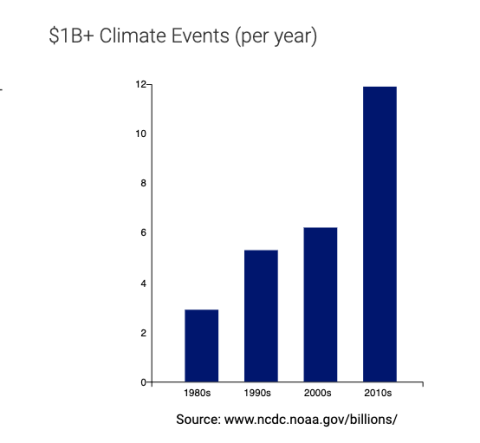-
 ClimateIQ™
ClimateIQ™Informing Decisions to Manage Mission Risks
Climate risks present a significant threat to federal infrastructure, equipment, and supply chains, but no two agency risk profiles are the same. With the ClimateIQ™ decision framework, LMI creates tailored, data-driven climate risk mitigation strategies for each customer’s unique mission needs and operational environment. With ClimateIQ™, LMI supports federal leaders in a wide range of decision-making, disclosure, and risk management responsibilities:
- Asset and capital planning
- Disaster response
- Infrastructure assessment
- Procurement
- Budgeting/financial reporting
- Environmental compliance
- National security
- Workforce development
Climate Risks Rising
Climate-related events, such as drought and flooding, are occurring with greater frequency. The annual average of extreme-weather events causing at least $1 billion in damages and loss, adjusted for inflation, has quadrupled since the 1980s according to the National Oceanic and Atmospheric Administration (NOAA). The surge continues within this decade. An average of 14.7 events per year since 2017 portends the likelihood of more than one billion-dollar disaster a month in the 2020s.
Tailored Solutions
To counter these escalating and pervasive risks, federal agencies should understand their unique vulnerabilities and the most effective mitigation techniques for their resources, policies, and procedures. LMI has the requisite customer knowledge, rooted in six decades of federal sector experience and complemented by data analytics informed by our ClimateIQ™ toolkit. This combination enables customers to leverage ClimateIQ™ to create practical, empirically sound risk mitigation recommendations.

-

ClimateIQ™ Toolkit
ClimateIQ™, LMI’s suite of tools focused on climate hazard and impact analysis, creates tailored, data-driven climate risk mitigation strategies suited to your organization’s unique needs and operational environment. The ClimateIQ™ toolkit supports federal leaders in a wide range of decision-making, disclosure, and risk management responsibilities:
- Local Climate Assessments (LCAs) provide detailed granular assessments of specific locations that use existing public tools and data to evaluate climate risks.
- Intermediate Range Meteorological Assessment (IRMA) allows more skillful near-term meteorological risk adjustments and serves as a bridge from observed climatological conditions to projected climate conditions.
- The Climate Data Extraction (CLIDE) tool pulls from existing NOAA systems to generate climate projection data, letting clients focus on the climate variables and time periods they choose.
-

Meaningful Results
LMI’s technical, programmatic, and analytic expertise has supported climate adaptation and mitigation efforts for the Department of Defense and Department of Homeland Security as well as federal clients such as the General Services Administration and NASA.
Delivering scenario-based analyses for the Fourth National Climate Assessment.
On behalf of the NOAA National Climate Assessment Technical Support Unit, LMI furnished climate modeling analysis for regional and sectoral authors of the Fourth National Climate Assessment. Our experts processed and analyzed high-resolution data for the U.S. from 32 distinct climate models, estimating changes in key variables as well as indicators and detailed metrics for effects on people, infrastructure, and the national economy.

-

Energy Resilience
LMI believes an organization’s energy resilience posture can be considered across five dimensions:
- Facilities & Infrastructure: Energy resilient buildings and campuses reduce dependence on vulnerable external supplies; they are crucial for sustaining operations.
- People: An informed workforce that understands energy dependencies and climate impacts is vital for promoting energy efficiency and conservation.
- Governance: Strong leadership commitment and comprehensive policy ensure accountability for energy resilience targets.
- Processes: Efficient management processes are essential for identifying vulnerabilities and implementing resilience strategies.
- Resources: Securing funding through various means and integrating innovative technologies is crucial for successful resilience initiatives.


Erwin Villiger
Principal, SustainabilityErwin is a senior subject matter expert with more than 25 years of experience at the nexus of national security and the environment.
-
More About Sustainability
 What We Do
What We DoSustainability
LMI adapts industry-leading approaches to customers’ unique mission needs. We support energy, sustainability, and climate resilience efforts with customizable analysis and reporting tools.
More About Sustainability
-
More About Data & Analytics
 What We Do
What We DoData & Analytics
LMI provides advanced data and analytic consulting expertise, pairing data scientists with domain experts to deliver innovative solutions at the pace of need.
More About Data & Analytics
-
More About LMI Forge
 The New Speed of Possible™
The New Speed of Possible™LMI Forge Technology Studio
Leveraging agile methods and human-centered design, LMI Forge empowers us to deliver technology solutions rapidly.
More About LMI Forge






